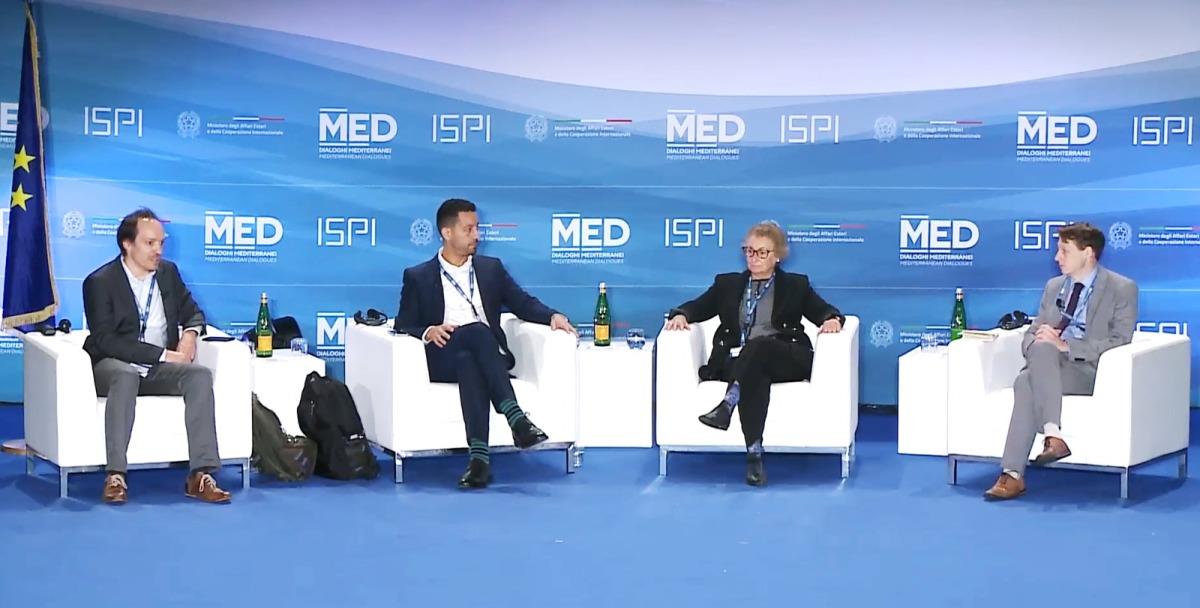
Challenges, Opportunities Of Palestinian Self-Governance Post-Gaza Truce
Naples: At Italy's flagship diplomatic forum, the 11th Mediterranean Dialogues (MED) Conference, 2025, a high-profile panel turned its attention to one of the most contentious issues in the Middle East: the "Gaza Peace Plan" or “Trump Plan for Gaza.”
The discussion, moderated by Director of the European Middle East Project (EUMEP), Martin Konecny, brought together leading Palestinian and European voices - Hiba Husseini, Obada Shtaya, and Hugh Lovatt - each offering sharp but nuanced views on what the plan could mean for Gaza's governance and the future of Palestinian statehood.
Opening the discussion, former head of the Legal Committee to the Palestinian Negotiations Team (1994–2008), Hiba Husseini, did not mince words.
“It may have stopped the fighting,” she said,“but it's not a peace plan - it's a rescue plan for Prime Minister Netanyahu, the Israeli government, and even the current US administration.”
Husseini described the proposal as politically expedient and dangerously vague, arguing that it sidelines Palestinians from shaping their own future. While it focuses narrowly on Gaza, she warned, it neglects the deepening crisis in the West Bank and fails to clarify who would rebuild Palestinian institutions.
She voiced particular concern about proposals for an international force to manage Gaza's transition, calling it“another form of colonization” reminiscent of the British Mandate era.
The MED Conference, hosted at Naples' Royal Palace from October 15–17, 2025, is organized by Italy's Ministry of Foreign Affairs in partnership with the Italian Institute for International Political Studies (ISPI).
Since 2015, the annual event has drawn policymakers, scholars, and civil society leaders to tackle issues ranging from security and migration to cultural exchange and sustainable growth.
This year's edition - marking Naples' 2,500th anniversary - reaffirmed Italy's push for a“Positive Agenda” in the Mediterranean. But as discussions unfolded, US efforts to assemble a Palestinian Technocratic Committee and a“Board of Peace” featuring figures like Tony Blair loomed large, sparking debate over whether Gaza and the West Bank could ever be truly reunited under such arrangements.
For co-founder and CEO of the Institute for Social and Economic Progress, Obada Shtaya, the stakes could not be higher.
“This is not just a war - it's an existential struggle,” he declared.“For many Palestinians, this is larger than the Nakba.”
Citing new polling data, Shtaya revealed that fear of forced displacement among Gazans surged from 5–8% early in the conflict to 25% at its peak.
After the ceasefire, 83% of Gazans said they were aware of the Trump plan, 68% understood its details, and 86% supported it - largely, he noted,“not because they believed in it, but because it stopped the bombs.”
Read Also-
AI and Middle East: Insights from MED Dialogues 2025
Europe and the Mediterranean: A shared destiny in fragmented world
Palestinian Minister calls for sustained truce, global support to rebuild Gaza
Yet deep skepticism remains. While three-quarters credited the US, Qatar, Egypt, and Türkiye for brokering the truce, a quarter feared Israel would never withdraw.
Support for Hamas governance, Shtaya added, has plunged to just 5%. Even among sympathizers, most want to see Hamas evolve into a political, not militant, movement.
Senior Policy Fellow at the European Council on Foreign Relations (ECFR), Hugh Lovatt, dissected the structural flaws of the Trump plan.
The proposal, he explained, calls for a Palestinian-led technocratic committee alongside a“Board of Peace” chaired by former President Trump and composed of Arab and European representatives.
Lovatt questioned how these bodies would interact - and warned that granting executive authority to an international board without Palestinian consent would“violate the core right to self-determination.”
“Gaza needs more than a committee,” he stressed.“It needs political renewal. Reconciliation, elections, and reunification are indispensable.” He urged a transformation of Hamas into a political actor within a unified Palestinian framework, arguing that only legitimate, representative governance could pave the way toward peace.
Returning to structural realities, Shtaya noted that 70–80% of the Palestinian Authority's budget comes from taxes collected - and often withheld - by Israel, leaving the administration financially fragile.
He described corruption as rooted less in embezzlement than in nepotism, and said true reform can only come through free elections.
“Fatah and Hamas occupy the same conservative political space,” he observed.“Meanwhile, 40% of Palestinians - young, progressive, and unaffiliated - feel politically homeless. The international community must create space for this generation to build the future state.”
Husseini returned to the theme of legitimacy, insisting that elections remain the cornerstone of Palestinian self-rule.
“We rebuilt our institutions once in the 1990s,” she reminded the audience,“but we haven't had a parliament since 2007.”
She urged renewed European engagement - including by Italy - to recognize the State of Palestine and support reunification between Gaza and the West Bank.
“Without ending the occupation,” she concluded,“no plan - Trump's or anyone else's - will succeed.”
As the panel drew to a close, Shtaya offered a sobering reflection on the uncertain path before Gaza.
“Palestinians know what they want - they just need the freedom to pursue it,” he said.“The international community must ensure that space exists, and Israel must face real pressure to allow it. Only then can genuine elections and legitimate governance emerge.”

Legal Disclaimer:
MENAFN provides the
information “as is” without warranty of any kind. We do not accept
any responsibility or liability for the accuracy, content, images,
videos, licenses, completeness, legality, or reliability of the information
contained in this article. If you have any complaints or copyright
issues related to this article, kindly contact the provider above.




















Comments
No comment